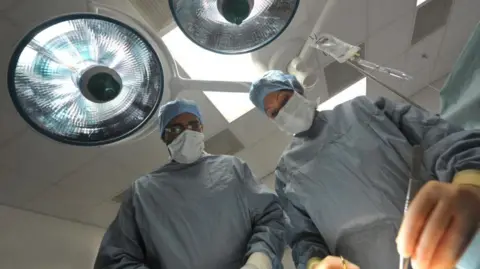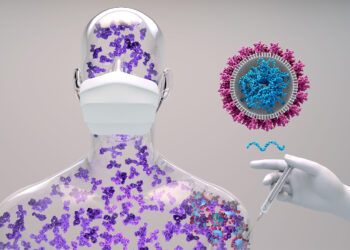Michelle RobertsDigital health editor, BBC News
 BBC
BBCIs it possible to become immortal with the help of organ transplants? That was the unexpected topic of discussion this week between Chinese President Xi Jinping and Russian President Vladimir Putin when they met at a military parade in Beijing.
A translator, speaking in Mandarin on behalf of Putin, told Xi how human organs can be repeatedly transplanted “so that one can get younger and younger” in spite of age, and might even be able to stave off old age “indefinitely”.
“It’s predicted that in this century it might become possible to live to 150,” he added.
Their smiles and laughter suggest it was a bit of banter, but might they be on to something?
Organ transplants certainly save lives – in the UK, over 100,000 people have been saved in the last 30 years, says NHS Blood and Transplant.
And continued advancements in medicine and technology mean transplanted organs are lasting far longer once in people.
Some patients have had a kidney transplant that has kept working for more than 50 years.
The lifespan of an organ depends on how healthy the donor and recipient is – plus how well they look after it.
For example, if you were to have a new kidney from a living donor, you might expect it to last 20 to 25 years.
If you get it from a deceased donor, that drops to 15 to 20 years.
The type of organ matters too.
A liver might last around 20 years, a heart 15 years and lungs nearly 10 years, according to research.
Ticket to eternal life?
Putin and Xi may be talking about having multiple organs transplanted and perhaps repeatedly.
Having surgery is a big undertaking, though, with significant risks. Each time you go under the knife you are rolling the dice.
Currently, people who get a new organ also have to take strong anti-rejection drugs called immunosuppressants for life. These can have side-effects, such as high blood pressure, and increase the risk of infections.
Rejection – when your immune system starts to attack the transplanted organ because it recognises it as coming from a different person – can sometimes still happen even if you are taking your medication.
Tailor-made organs
Scientists are working on making rejection-free organs, using genetically-altered pigs as the donors.
They use a gene editing tool known as crispr to remove some of the pig genes and add certain human genes to make the organ more compatible.
Breeding special pigs for this is ideal, say experts, since their organs are roughly the right size for people.
The science is still extremely experimental, but a heart and a kidney operation have gone ahead.
The two men who agreed to having the procedures were pioneers of this new field of transplantation medicine.
Both have since died but helped advance xenotransplantation – the transplanting of living cells, tissues or organs from one species to another.
Another avenue being explored is growing brand new organs using our own human cells.
Stem cells have the ability to grow into any type of cell or tissue found in the body.
No research group has yet been able to make fully functional, transplantable human organs, but scientists are getting closer.
In December 2020, UK researchers UCL and the Francis Crick Institute rebuilt a human thymus – an essential organ in the immune system – using human stem cells and a bioengineered scaffold.
When transplanted into mice as a test, it appeared to work.
And scientists at Great Ormond Street Hospital in London say they have grown human intestinal grafts using stem cells from patient tissue that could one day lead to personalised transplants for children with intestinal failure.
But these advances are for treating ill health, rather than keeping people alive to 150.
 Bloomberg via Getty Images
Bloomberg via Getty ImagesTech entrepreneur Bryan Johnson, meanwhile, is spending millions a year trying to reduce his biological age.
He’s not tried getting new organs yet – as far as we know – but has infused himself with his 17-year-old son’s plasma.
He’s since stopped that, after seeing no benefits and increased medical scrutiny from organisations such as the Food and Drug Administration.
Dr Julian Mutz from King’s College London said beyond organ transplantation, approaches like plasma replacement are being explored, but these remain experimental.
“Whether such strategies will have a meaningful impact on lifespan, particularly maximum human lifespan, remains uncertain, though it is an area of considerable scientific interest.”
Prof Neil Mabbott, an expert in immunopathology at the Roslin Institute, University of Edinburgh, speculates that living to 125 years old might be the upper limit.
“The verified oldest living person was a Frenchwoman, Jeanne Calment who lived for 122 years, between 1875 and1997, ” he told BBC News.
 Getty Images
Getty ImagesAnd while damaged and diseased organs may be replaceable by transplants, as we age our bodies become much less resilient or able to cope with physical stressors.
“We begin to respond less effectively to infections, and our bodies become more frail, prone to injury and are less able to recover and repair.
“The stress, trauma and impact of transplant surgery, alongside the continued use of immunosuppressive drugs required to prevent rejection of the transplanted organs would be too severe in patients of such advanced age.”
He says rather than focussing on extending life-span, we should instead strive for healthy years lived.
Prof Mabbott said: “Living a lot longer, but suffering from the multiple morbidities that can accompany ageing, and in-and-out of hospital for another tissue transplant does not sound an attractive way to spend my retirement!”
Source link : https://www.bbc.com/news/articles/cly1w9z72r6o?at_medium=RSS&at_campaign=rss
Author :
Publish date : 2025-09-04 12:25:00
Copyright for syndicated content belongs to the linked Source.












